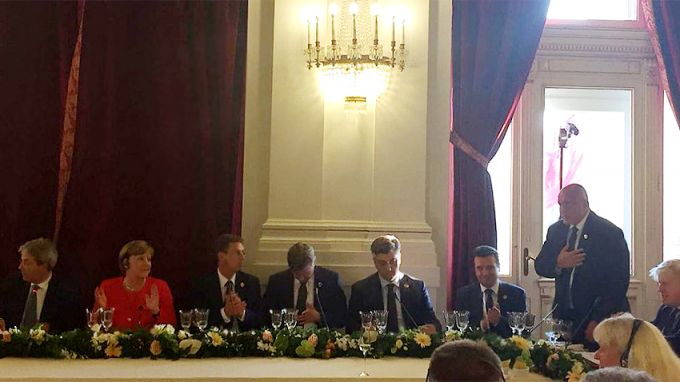
As the mercury is peaking this summer, so is the intensity of the foreign policy steps Bulgaria has been taking with regard to the region of the Balkans. Prime Minister Boyko Borissov is in Thessaloniki today for a trilateral summit with the Prime Minister of Greece Alexis Tsipras and the President of Serbia Aleksandar Vucic. His participation in this meeting, convened to coordinate joint action in the sphere of energy and transport connectivity, migration pressure and the challenges facing the Western Balkans, is but a link in the chain of steps Bulgaria has been taking in its regional foreign policy.
Borissov arrived in Thessaloniki from Trieste, where he took part in Wednesday’s EU-Western Balkans summit. Addressing the meeting, the Bulgarian PM reiterated his government’s unwavering commitment to the preparation of the countries of the Western Balkans for membership of the EU, describing the connecting infrastructure as vital to the assertion of the region’s European future. Bulgaria was particularly pleased with the European Commission’s intention, made public even before the Trieste meeting, of financing Pan-European Corridor No. 8 from the Black to the Adriatic Sea, connecting Sofia and Skopje by road and rail.
While the EU-Western Balkans summit was taking placein Trieste, in Sofia Deputy Prime Ministers Tomislav Donchev and Ekaterina Zaharieva were discussing steps for the construction of a gas connection between Bulgaria and Greece with Mary Warlick, Principal Deputy Assistant Secretary in the US State Department's Bureau of Energy Resources. The future cooperation between the two countries in the energy sector was discussed in view of the need to guarantee energy security in the whole of Southeastern Europe. Attention focused primarily on projects of strategic importance to the country such as linking Bulgaria’s gas transmission system to the gas transmission systems of Turkey, Serbia and Romania.
Before that, at the World Petroleum Congress in Istanbul, on Monday, PM Borissov held multilateral talks with the presidents of Turkey and Serbia –Recep Erdogan and Aleksandar Vucic and his Albanian counterpart Edi Rama – as well as a bilateral meeting with Turkish Prime Minister Binali Yildirim on issues of regional cooperation in energy and energy connectivity. Bulgaria’s partners in the region were given assurances that once the gas connection with Romania is built, Borissov’s government would then focus on speeding up the construction of the gas connections with Turkey, Greece and Serbia.
Energy Minister Temenuzhka Petkova on her part held talks in Belgrade with her Serbian counterpart Aleksandar Antic on bilateral steps in the energy sector, with a focus on a Bulgaria-Serbia gas connection. Energy cooperation was also in the focus of attention during the visit by President Rumen Radev to Montenegro. During his talks there, President Filip Vujanovic and Prime Minister Dusko Markovic invited Bulgaria to join a project for the construction of an electric power transmission line between Montenegro and Italy, across the Adriatic.
The intensity of Bulgaria’s regional policy has been extraordinarily high these past few days, but this is only logical and to be expected. At the EU summit back in June, Prime Minister Borissov reaffirmed Bulgaria’s readiness to take part in the so-called Berlin process of accelerating the European integration of the Balkans. The integration of the Balkans is, indeed, one of the three top priorities of the upcoming Bulgarian presidency of the Council of the EU in the first half of next year. The steps taken in Bulgaria’s regional policy this week are an indication that these goals are shared and well supported.
English version: Milena Daynova
"The 'Zhelyazkov' cabinet must continue to work, even as a minority government." This was GERB leader Boyko Borissov's comment on the Constitutional Court's decision to order the Central Election Commission to recalculate the results of the..
Călin Georgescu remains the favorite for the presidential election in Romania Călin Georgescu, who won the annulled first round of the presidential elections in November 2024 as an independent candidate, remains the..
On February 15 and 16, the Bulgarian Socialist Party (BSP) is holding its 51st Congress. Interim Chairman Atanas Zafirov is expected to present a report on the past period. The delegates are also expected to vote on amendments to the party's statute,..
"The 'Zhelyazkov' cabinet must continue to work, even as a minority government." This was GERB leader Boyko Borissov's comment on the Constitutional..

+359 2 9336 661
